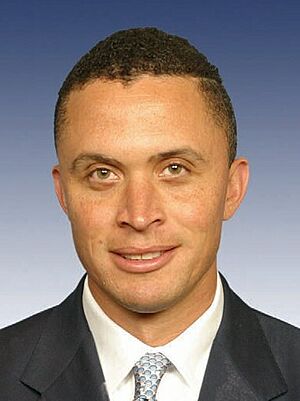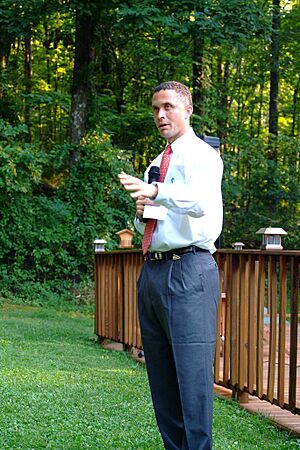Harold Ford Jr. facts for kids
Quick facts for kids
Harold Ford Jr.
|
|
|---|---|
 |
|
| Member of the U.S. House of Representatives from Tennessee's 9th district |
|
| In office January 3, 1997 – January 3, 2007 |
|
| Preceded by | Harold Ford Sr. |
| Succeeded by | Steve Cohen |
| Personal details | |
| Born |
Harold Eugene Ford Jr.
May 11, 1970 Memphis, Tennessee, U.S. |
| Political party | Democratic |
| Spouse |
Emily Threlkeld
(m. 2008) |
| Children | 2 |
| Parent | Harold Ford Sr. (father) |
| Education | University of Pennsylvania (BA) University of Michigan (JD) |
Harold Eugene Ford Jr. was born on May 11, 1970. He is an American who works in finance, writes books, and shares his opinions on TV. He was a U.S. Congressman for Tennessee from 1997 to 2007. He was part of the Democratic Party and represented the area around Memphis.
Harold Ford Jr. comes from a well-known political family in Memphis. His father, Harold Ford Sr., was also a Congressman for 22 years in the same area. In 2006, Harold Ford Jr. tried to become a U.S. Senator but didn't win. He also led a group called the Democratic Leadership Council.
From 2011 to 2017, Ford worked for a big financial company called Morgan Stanley. He often appeared on TV shows like Meet the Press, MSNBC, CNN, and CNBC to talk about politics.
In December 2020, Ford became a Vice Chairman at PNC Financial Services, another large financial company. He lives in New York City with his wife and their two children, Georgia Walker and Harold Eugene III.
Ford also wrote a book called More Davids Than Goliaths: A Political Education, which came out in 2010. In April 2021, he joined Fox News as a political expert. He often appears on Special Report and became a co-host of The Five in January 2022.
Contents
About Harold Ford Jr.'s Family and School Life
Harold Ford Jr. was born in Memphis, Tennessee. He is the oldest son of former Congressman Harold Ford Sr. and Dorothy Bowles Ford. He has two brothers, Jake and Isaac, and two half-siblings, Andrew and Ava.
The Ford family has been very important in the Black community in Memphis for a long time. Harold Ford Jr.'s grandfather, N. J. Ford, started a funeral home, which helped the family connect with many people in the community.
Harold Ford Jr. spent his early years living in the funeral home his family owned. He went to Double Tree Elementary School, a public Montessori school. Later, he graduated from St. Albans School, a private school in Washington, D.C., after his father became a Congressman. He then went to the University of Pennsylvania and earned a degree in American history in 1992.
Starting His Career and Studying Law
After college, Ford started working in government. He was an assistant for the Senate Budget Committee. In 1993, he became a special assistant at the United States Department of Commerce.
Ford went back to school in 1996 to get a law degree from the University of Michigan Law School.
Time in the House of Representatives
When his father, Harold Sr., decided not to run for Congress again in 1996, Harold Jr. decided to run for the same seat. He was expected to win because the area was strongly Democratic. He won the election easily and became a Congressman at 26 years old. This made him one of the youngest members of Congress in U.S. history. He was also one of the first members of Generation X to serve in Congress.
He was reelected four times without much challenge from the Republican Party. In 2000, Ford was a main speaker at the 2000 Democratic National Convention, supporting Al Gore for President.
On October 10, 2002, he was one of the House Democrats who voted to allow the invasion of Iraq.
In November 2005, during a debate in the House, a Republican Congresswoman said something that many Democrats thought was unfair about a Marine Corps veteran. Ford quickly reacted, showing his support for the veteran. He had to be calmed down by another Congressman.
Ford supported some ideas that were popular with both Democrats and Republicans. He was against oil drilling in the Arctic National Wildlife Refuge. He supported the right for same-sex couples to adopt children. He was also in favor of government funding for embryonic stem cell research and wanted universal healthcare coverage. He was against the death penalty and wanted to change some drug laws.
Ford was part of important committees in the House, including the House Budget Committee and the House Committee on Financial Services. He was also a member of groups like the New Democrat Coalition and the Congressional Black Caucus.
In 2006, Ford decided not to run for re-election to the House. Instead, he ran for the United States Senate in Tennessee. He won the Democratic primary election, but he lost the general election by a small amount. His younger brother, Jake Ford, ran for the same House seat as an Independent but lost to Steve Cohen.
Running for the U.S. Senate in 2006
On April 6, 2005, Harold Ford Jr. announced that he would run for the United States Senate. He officially started his campaign on May 25, 2005. He easily won the Democratic primary election on August 3, 2006. After his primary win, his supporters held a big celebration in Nashville, where former U.S. President Bill Clinton spoke.
Ford ran against Republican Bob Corker in the November 2006 election. They had several televised debates across Tennessee.
During the campaign, some ads were criticized for being unfair. One radio ad played drums when Ford's name was mentioned, which some people said was meant to attack his race. Another TV ad caused a lot of discussion and was called out by many, including a former Republican Senator, for being inappropriate. The Republican Party later removed this ad.
On November 8, 2006, Ford accepted his loss to Corker, who won by less than three percent of the votes.
After Congress
After leaving Congress, Harold Ford Jr. continued to be active in public life. In January 2007, he became the chairman of the Democratic Leadership Council.
In March 2007, Ford joined a financial company called Merrill Lynch as a vice chairman. He also started working for Fox News Channel as a political expert. In March 2008, he moved to MSNBC as a news analyst, appearing on shows like Hardball and Morning Joe.
Ford has also taught at several universities. He was a visiting professor at Vanderbilt University in 2007, teaching about American political leadership. He also taught at the Lyndon B. Johnson School of Public Affairs at the University of Texas at Austin and at New York University's Wagner School of Public Service. In 2015, he was a visiting faculty member at the University of Michigan Ford School of Public Policy.
Ford worked at the Wall Street company Morgan Stanley as a managing director.
Considering a Senate Run in New York in 2010
In 2010, Ford thought about running for a U.S. Senate seat in New York. However, he decided not to run against Senator Kirsten Gillibrand. On March 1, Ford wrote an article in The New York Times saying he would not run.
Personal Life
Harold Ford Jr. married Emily Threlkeld on April 26, 2008. Emily works in public relations for a fashion designer. They have a daughter named Georgia Walker Ford and a son named Harold Eugene Ford III, who was born in May 2015.
Images for kids
 | Percy Lavon Julian |
 | Katherine Johnson |
 | George Washington Carver |
 | Annie Easley |




